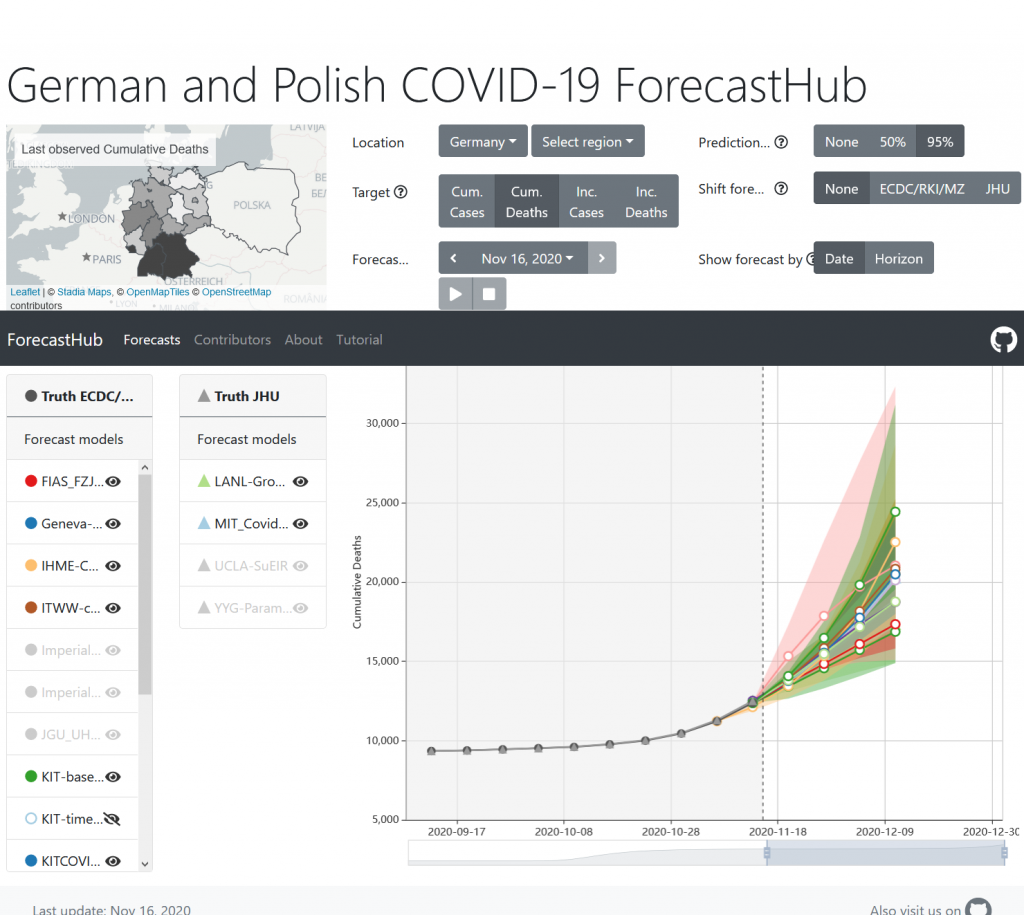Mapping the uncertainty: COVID-19 forecasts
Researchers from the Heidelberg Institute for Theoretical Studies (HITS) and the Karlsruhe Institute of Technology (KIT) have developed a web platform that bundles short-term forecasts of Corona infection cases. This open source project brings together modelers from Germany, Poland, the UK, Switzerland and the USA. It compares their forecasts systematically and processes them into ensemble predictions.
The future is uncertain, but there is one thing we can be sure of: The Corona pandemic will not be over at the end of the year. Hence, forecasts of the infection numbers are valuable to assess the development of the pandemic. The “German-Polish COVID-19 Forecast Hub” seeks to support these efforts. A team of researchers from the Heidelberg Institute for Theoretical Studies (HITS) and the Karlsruhe Institute of Technology (KIT) have developed an online platform that bundles short-term forecasts of the further course of the pandemic in the neighboring countries Germany and Poland. The main data sources come from the Robert Koch Institute (RKI) in Germany, the European Centre for Disease Prevention and Control (ECDC), and the Polish Ministry of Health.

“Our goal is to systematically compare different predictions, identify particularly reliable models and assess whether combinations of different forecasts can yield more reliable results”, says Melanie Schienle, professor for Statistics and Econometrics at KIT, who leads the project team together with Tilmann Gneiting from the Computational Statistics group at HITS. They are supported by the Signale Team at the RKI, who have developed the interactive visualization tool. 16 research teams from the U.S., United Kingdom, Switzerland, Germany and Poland are contributing forecasts on the basis of their respective data models. The Hub processes these different data sets into an ensemble forecast. The project is developed in close exchange with the US COVID-19 ForecastHub run by the Reich Lab at the University of Massachusetts, Amherst, USA.
“We assemble short-term forecasts of confirmed cases and deaths from COVID-19”, explains Johannes Bracher (KIT and HITS), the postdoctoral researcher coordinating the project. “Our main focus lies on forecasts of one or two weeks into the future – longer forecast horizons could be affected by political interventions such as lockdowns.” Like weather forecasts, the predictions are in real time. “We believe that ex post analyses often tend to be too optimistic”, says Melanie Schienle. “We also aim to assess more generally how far into the future forecasts can be reliable. Models should be evaluated critically and not be treated like crystal balls.“ As forecasts take the form of probability distributions, they also explicitly map the uncertainty in the forecast. „At this point of the study we can already say that there is not a single model which always does best. But there is promise in ensemble approaches which combine different forecasts”, Johannes Bracher adds.
The project is funded by the Initiative and Networking Fund of the Helmholtz Association. The fund supports new research topics that are developing dynamically and require the cooperation of many different fields of the Helmholtz Association.
More information: https://kitmetricslab.github.io/forecasthub/forecast
Information on Helmholtz Information and Data Science Pilot Projects: https://www.helmholtz.de/en/research/information-data-science/information-data-science-pilot-projects/pilot-projects-2/
Press Contact:
Dr. Peter Saueressig
Head of Communications
HITS Heidelberg Institute for Theoretical Studies
Phone: +49-6221-533-245
peter.saueressig@h-its.org
Scientific Contact:
Prof. Dr. Tilmann Gneiting
Computational Statistics Group (CST)
Heidelberg Institute for Theoretical Studies (HITS)
Prof. Dr. Melanie Schienle
Statistics and Econometrics
Karlsruhe Institute of Technology (KIT)
Johannes Bracher
Statistics and Econometry, KIT/ Computational Statistics Group, HITS
About HITS
HITS, the Heidelberg Institute for Theoretical Studies, was established in 2010 by physicist and SAP co-founder Klaus Tschira (1940-2015) and the Klaus Tschira Foundation as a private, non-profit research institute. HITS conducts basic research in the natural, mathematical, and computer sciences. Major research directions include complex simulations across scales, making sense of data, and enabling science via computational research. Application areas range from molecular biology to astrophysics. An essential characteristic of the Institute is interdisciplinarity, implemented in numerous cross-group and cross-disciplinary projects. The base funding of HITS is provided by the Klaus Tschira Foundation.